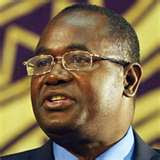HARARE (Xinhua) -- The three parties in Zimbabwe's Global Political Agreement on Monday started negotiations to iron out differences which have created deep chasms within the country's inclusive government, in line with a SADC resolution passed in Maputo, Mozambique on Nov. 5.
Negotiations went well into the evening, with none of the chief negotiators shedding light on what was going on behind doors, according to the state controlled Herald newspaper.
There is an agreement that the media should not have a blow by blow account of the discussions, as this would be tantamount to negotiating in public.
President Robert Mugabe's Zanu-PF is represented by Patrick Chinamasa and Nicholas Goche, while Prime Minister Morgan Tsvangirai's MDC is represented by Tendai Biti and Elton Mangoma.
Welshman Ncube and Priscillah Misihairabwi-Mushonga represent Deputy Prime Minister Arthur Mutambara's smaller MDC faction.
Talks had been scheduled to begin by Nov. 20 as per the resolution of the summit of the SADC troika on politics, defense and security that they should start within 15 days, but the negotiators failed to achieve this, citing other pressing government commitments.
The troika was flexible, however, giving room that negotiations should not start later than 30 days from the date of the resolution.
The GPA, signed on Sept. 15 2008 after a serious political and economic crisis in Zimbabwe and the absence of a clear winner in that year's general elections, resulted in the formation of the inclusive government in February.
Under the agreement, Mugabe retained his post while Tsvangirai became prime minister and Mutambara became deputy prime minister.
However, Tsvangirai on Oct. 16 announced his party's partial withdrawal from the government, citing unfulfilled promises by Mugabe's Zanu-PF, and prompting the SADC to hold a troika summit.
Among other issues, Tsvangirai's party wants the appointments of Reserve Bank of Zimbabwe Governor Gideon Gono and Attorney-General Johannes Tomana reversed.
It also wants Mugabe to swear into office its treasurer Roy Bennett as deputy minister of agriculture, mechanization and irrigation development. Mugabe has said he will not swear Bennett into office until he is cleared of the terrorism, insurgency and banditry charges he is facing in the courts of law.
Together with Mutambara's smaller MDC faction, Tsvangirai also wants the appointment of provincial governors to be done on the basis of which party prevailed in the provinces during the March 2008 harmonized elections.
Zanu-PF has declared that the appointments of Gono, Tomana and provincial governors are non-issues in the GPA, although it has softened a bit on provincial governors, saying negotiators could reach an agreement on these.
On its part, Zanu-PF wants Tsvangirai's party to make an unequivocal call for the removal of economic and travel sanctions on its members, as per its promise in the GPA. While the international community has maintained that the sanctions are targeted, ordinary Zimbabweans have felt their pinch over the years.
MDC-T also argues that it has no capacity to have the sanctions removed, adding that the onus is on Zanu-PF to satisfy the international community's expectations in the area of good governance.
Among the issues Zanu-PF regards as outstanding are the setting up of a National Economic Council, the constitution-making process and a land audit, which it says are constrained by lack of funds "and the rather crowded agenda."
The party also wants radio broadcasts beaming into Zimbabwe from beyond its borders to be stopped. The broadcasts are generally anti-Zanu-PF, even though some party officials have granted interviews to the radio stations.
In its argument on the radio stations, Tsvangirai's party is calling for the opening up of the media landscape to allow other players to compete with the national broadcaster, Zimbabwe Broadcasting Corporation. It also says it does not own or support any radio station
 Such as this Glamour Magazine which cost me £2, but they included a bottle of £10 Nails Inc polish for readers.
Such as this Glamour Magazine which cost me £2, but they included a bottle of £10 Nails Inc polish for readers. This £1.50 Sanitary Pad is totally awesome in this gifts, such as this Jemma Kidd Make Up School Lip Gloss which RRP is £10. Wasai, I love anything to do with free make-ups. That's why I have tons of Lip Gloss cuz every free products seems to be them -__-'''
This £1.50 Sanitary Pad is totally awesome in this gifts, such as this Jemma Kidd Make Up School Lip Gloss which RRP is £10. Wasai, I love anything to do with free make-ups. That's why I have tons of Lip Gloss cuz every free products seems to be them -__-'''



















































